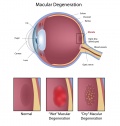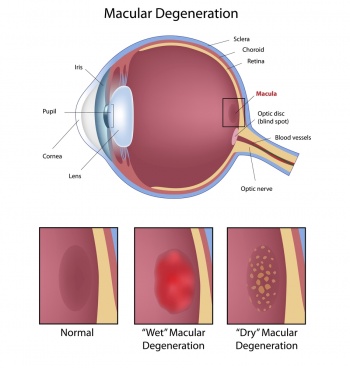Macular Degeneration
|
Macular degeneation | |
| Causes | Posture, Alcohol, Nutritional imbalances, Trauma |
|---|---|
| See Also | Head, Ears, Eyes, Nose and Throat Conditions, Cataracts, Glaucoma |
| Books | Books on Head, Ears, Nose and Throat Conditions |
| Articles | Articles on Head, Ears, Eyes, Nose and Throat Conditions |
Macular degeneration refers to a spectrum of conditions that result in severe loss of central vision. These conditions can range from macular changes to the eyes, new blood vessel formation, and scarring.
Naturopathic Assessment
Causal Factors
In order to stimulate the innate ability of the body to heal the causes of disease must be identified and addressed. With macular degeneration, the causes are variable and include lifestyle and external factors. A detailed assessment is required to determine which factors are contributing to macular degeneration.
Lifestyle
- Alcohol consumption increases the risk of developing age-related macular degeneration.
- Poor posture can be found to increase the risk of macular degeneration formation.
Environmental
- Sunlight
External
- Trauma
- Trauma such as a blow, cuts, radiation, or intense hot/cold is associated with increased risk.
Medical Interventions
- Prescription Medications
- Eye drops containing steroids can increase the risk of macular degeneration.
Physiology
- Age
Diagnostic Testing
The diagnosis of macular degeneration is generally based on the age of the patient and the clinical presentation of signs and symptoms. The Amsler grid test may be used to detect central visual field deficits. Further opthalmoscopic examination may reveal the presence of drusen (yellow pigmentation) or blood at the site of the macula.
Related Symptoms and Conditions
Individuals with the following conditions have an increased risk of macular degeneration.[7]
- obesity
- high blood pressure
- heart disease
- Familial dominant drusen
- Stargardt's disease
- Fundus flavimaculatus
- Diabetic retinopathy
- Ocular Histoplasmosis
Characteristics
Macular degeneration can be classified as two types: Atrophic (dry) macular degeneration, and Exudative (wet) macular degeneration.
- Atrophic or dry macular degeneration accounts for 90% of cases, and is characterized by thinning and loss of tissues underlying the macula.
- Exudative or wet macular degeneration occurs with leakage of fluid from blood vessels, which eventually leads to scarring. It is associated with more profound and rapid loss of vision.
Common Symptoms
Common signs and symptoms of macular degeneration include:
- Early presentation of decreased reading acuity or decreased night vision.
- Loss of central vision
- Distortion of vision
- Field loss, also referred to as central scotoma
- Drusen, or yellowish deposits on the macula which can be hard, soft, large(>125mcm), or small
- Macular pigmentation in surrounding areas
- Hemorrhage at macula
Naturopathic Treatment
The goal of naturopathic treatment is to support and work in tandem with the healing power of the body and to address the causal factors of disease with individual treatment strategies.
It is always advisable to work with a naturopathic doctor before engaging in any treatment plan.
Home Care
Home Care strategies include:
- Yearly eye exams are important in order to monitor the progression of the condition.
- Wear UV-protecting sunglasses and hats if spending a lot of time in intense sunlight.
- If you have the start of macular degeneration you may find that magnifying glasses, closed circuit television, and large-print reading material are beneficial.
Lifestyle
Lifestyle recommendations include:
- Address any dietary triggers
- Ensure you drink adequate water.
- Practice eye exercises daily.
- In general, regular exercise is important to increase blood flow and oxygen to the eyes. It can also help rebalance postural muscles, thereby helping to maintain proper alignment of the spine
- Be aware of your posture and address any signs of poor or imbalanced posture.
- Ensure proper ergonomics at home and work.
- Obtain adequate sleep to give your eyes a good rest.
- Take regular computer breaks every 30-40 minutes.
Naturopathic Therapies
The prescribing of naturopathic therapies requires the guidance of a naturopathic doctor as it depends on a number of factors including the causal factors, a person's age, prescription medications, other conditions and symptoms and overall health. It is always advisable to work with a naturopathic doctor prior to taking any natural therapies.
Naturopathic Therapies for macular degeneration include:
- Clinical Nutritional Supplementation includes:
- Vitamins such as vitamin A, C, D and E
- Minerals such as zinc, copper, magnesium, boron, manganese, chromium, selenium
- Amino Acids such as taurine and cysteine
- Other supplements or food containing lutein and zeaxanthin such as green leafy vegetables: kale, spinach, collards, romaine lettuce, as well as turnip greens, green peas, broccoli, corn, carrots, and eggs. Also, foods containing beta-carotene, and supplements such as Omega-3 fatty acids, N-acetyl cysteine, astaxanthin, coenzyme Q10 and grape seed extract,Bioflavonoids
.
- Herbs such as Bilberry (Vaccinium myrtillus), Ginkgo (Ginkgo Biloba), Dandelion root (Taraxacum officinale).
- Classical homeopathics: Agaricus, Arnica montana, Bovista, Carboneum sulph, Calcarea ars, Hamamelis, Lachesis, Phosphorus, Secale, Sepia, Staphysagria
- Hot/cold water applications can be useful for macular degeneration
- Naturopathic manipulation may be beneficial, especially if the macular degeneration is due to postural misalignment
References
- ↑ Seddon JM, Umed AA, Sperduto RD, Hiller R, Blair N, Burton TC, Farber MD, Gragoudas ES, Haller J, Miller DT, Yannuzzi LA, Willett W. (1994) Dietary carotenoids, vitamins A, C, and E, and advanced age-related macular degeneration, JAMA; 272(18):1413-1420.
- ↑ West SK, Rosenthal FS, Bressler NM, Bressler SB, Munoz B, Fine SL, Taylor HR. (1989) Exposure to sunlight and other risk factors for age-related macular degeneration, JAMA; 107(6):875-879
- ↑ Beatty S, Koh H, Phil M, Henson D, Boulton M. (2000) The role of oxidative stress in age-related macular degeneration, Survey of Ophthalmology;45(2):115-134.
- ↑ Hammond BR, Wooten BR, Snodderly DM (1996) Cigarette smoking and retinal carotenoids: Implications for age-related macular degeneration, Vision Research;36(18):3003-3009.
- ↑ De Jong, Paulus. (2006 )Age-related macular degeneration, NEJM; 355:1474-1485
- ↑ Ting AYC, Lee TKM, MacDonald IM (2009) Genetics of age-related macular degeneration, Current Opinion in Opthamology;20(5):369-376.
- ↑ Johnson, EJ(2005)Obesity, lutein metabolism, and age-related macular degeneration: A web of connections, Nutrition Reviews;63(1):9-15

